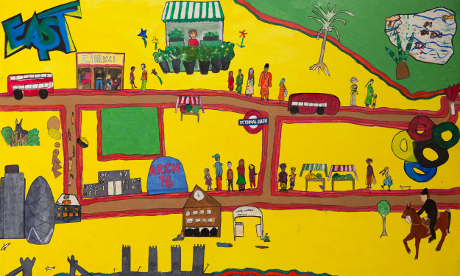
Down a back road in Bethnal Green, tucked under the smog-stained railway bridge, a grey dingy arch has come to life with colour. Artwork explodes on the walls; knitted blankets, golden prophecy paintings, and jewellery made from old car tyres are crammed into every corner. Inside, 12 women, old and young, talk over each other to show off their art and tell their stories.
“When I first came here I was so dirty, you could stick me to the walls,” says Tracy, 41. “It saved my life this place. It gave me hope, it gave me love and it gave me friendship. I’d never done anything like this before.” Arch 76 is a charity-based art project that was set up two years ago by Wendy Rolt. The idea was to create a safe space for vulnerable women to gather; away from men; sheltered from the streets where many of them have lived, and far from the drugs and abuse that had made them lose hope.
In the whitewashed brick room, through a combination of artwork and group chats, many of the women who are battling addiction or mental illness, have found a new focus in painting. Tracy has become deeply entrenched in the religious aspect of the group. Though women from all faiths are welcome, she draws on the short bible passages they read each time they meet, depicting, with massive swirls of gold paint what she’s understood. She points at one of her pictures hung on the wall. “In this story, this person was murdered by his half-brother. A lot of those stories, you see, we can relate to.”
The art project has become a community staple in Bethnal Green. Although the location is kept quiet for the security of the women, local cafés and cinemas have provided breakfasts and organised film outings. A gallery in Brick Lane helped them put on an exhibition of their work, with the money from sales going straight into their pockets. “It was the first time some of them had made any money themselves,” says Rolt. “ – at least legally.”
Most of the women who attend come regularly, and they see the group as family – for some it’s the only one they’ve ever had. And for others, it’s the only time they’ve had the chance to have their voice heard, either through group chats or by using the myriad of supplies that burst out of drawers and cabinets. “I don’t think that art is the answer,” says Rolt, who volunteered at a rehab centre before starting the charity. “But it’s a way of being creative, and it really encourages them. Some are more shy, and the group meetings bring out more in them.”
She adds: “We once read a story about fasting. And it brought out a lot of the women saying they fast – but not out of choice. Until then they’d been too scared to tell people they had run out of food money.” After that, many of the group members brought in extra food to share when they met twice a week.
“I know we can’t do everything, and that can be hard,” says Rolt. “We have to be really honest. We can’t do their housing, we can’t do their benefits, but we can be there for each other through all of that. It’s what friends are for. We have a lot of birthday parties here. Some of the women have never even had a cake.”
